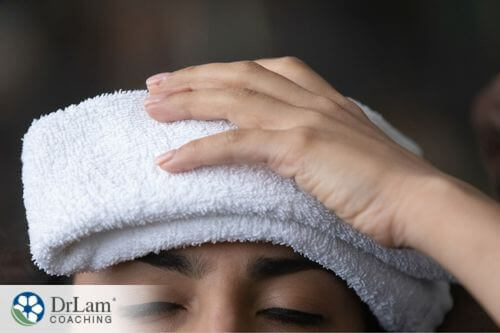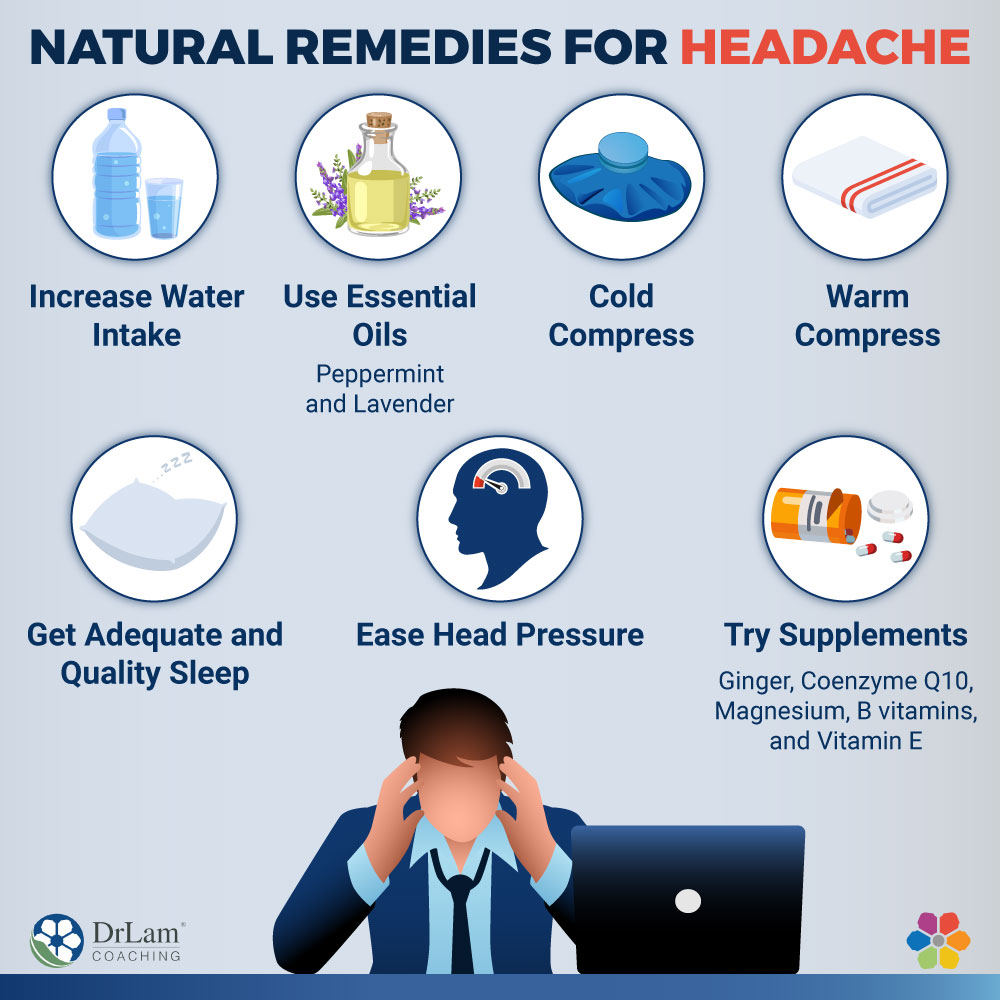We have all had a headache at some point in our lives. For many, the solution to a headache is popping a painkiller medication, but drugs are not always the answer. There are many natural headache remedies that can significantly reduce the pain and discomfort associated with headaches, without the side effects of medication. We consider seven of them below.
There are more than 150 types of headaches, and with a number that high, you can expect an extensive list of potential causes of a headache. While it is impractical to outline all of these causes, we have identified some of the most typical causes of headaches. They include:

These causes or triggers can be limited to different headache types. For instance, bright or flashing lights is associated more with migraine headaches. Nonetheless, any of the above can cause a headache at any time.
These headache remedies are some of the most effective ways of managing a headache. Below, we consider seven of the best.
Studies show dehydration can cause or exacerbate a headache. In fact, many experts regard dehydration as one of the most common causes of headaches. Aside from its role in the causation of headaches, dehydration can also cause irritability and alter people’s thinking and normal functioning. That can worsen any headache an individual is experiencing and promote malaise.
Therefore, it is no surprise that drinking more water is one of the natural headache remedies. While there’s not an abundance of studies in this regard, researchers find that drinking water can not only make one feel better but may also reduce headache duration and occurrence.
Some other studies aren’t as definitive, with results showing that drinking water will not reduce the duration of headaches. But even these studies admit that water can make individuals nursing a headache feel better.
You can expect to see improvements within 30 minutes to three hours of drinking water if you have a headache.
The use of essential oils for therapeutic interventions dates back centuries, and studies show they are useful natural headache remedies. Essential oils that have shown the best results are peppermint and lavender oils. However, eucalyptus oils also show promise in managing headaches.
There are two primary ways of using essential oils – inhalation or topical application. The inhalation of essential oils is a technique known as aromatherapy, and it involves boiling the oils and simply inhaling the resultant steam. You can also apply essential oils topically by rubbing them onto the skin, particularly the temple of the forehead and the wrists. However, be sure to test the essential oil on a small area of skin first and dilute it in a carrier oil by putting a few drops of essential oil in another oil like olive or coconut oil before use, as some oils can cause allergic reactions or be very strong.
Studies confirm that a cold pack or compress can temporarily but significantly reduce headache pain. The method of application of a cold compress is easy. You simply put pressure on the forehead with the compress for at least 15 minutes, enough to reduce pain. However, a study noted that for best results, the cold compress may need to be applied for around 30 minutes.
You don’t have to stress too much about finding a cold compress too. If you don’t have an ice pack, you can wrap some ice cubes in a cloth and apply them to the head. Cold water or even frozen vegetables will do in a pinch. You can also apply the compress to the back of your neck and temple.
The principle behind using a cold compress is that the resultant constriction of blood vessels due to the cold can reduce inflammation. This can be useful for many types of headaches, like migraines.
A note of warning, though: ice should not be in direct contact with the skin. This can increase irritation and cause even more pain. If you can’t get your hand on an ice pack or ice cubes, you can try a cold shower, as it can have similar effects.
 A warm compress is one of the best natural headache remedies that can help reduce the severity of a headache. While a cold compress helps constrict blood vessels to reduce inflammation, a warm compress relaxes muscles around the head. This relaxation effect is especially useful for headaches like tension-type headaches, which are easily the most typical type of headache.
A warm compress is one of the best natural headache remedies that can help reduce the severity of a headache. While a cold compress helps constrict blood vessels to reduce inflammation, a warm compress relaxes muscles around the head. This relaxation effect is especially useful for headaches like tension-type headaches, which are easily the most typical type of headache.
You can use a heated towel as your warm compress, either moist or not. A warm bath will also suffice. However, be sure that the hot water is not heated too hot that it scalds and inflames your skin.
You can significantly reduce the severity and frequency of headaches with adequate sleep. Scientists have found that low-quality and insufficient sleep can cause severe headaches, and quite frequently too.
It is important to note that you can sleep for the recommended time, about seven to eight hours, and still wake up with headaches. This is likely due to poor sleep quality, for example, among people with sleep apnea. Also, sleeping too much can result in headaches. Over nine to ten hours of sleep is too much for most adults.
If you have difficulty sleeping, you can adopt a sleep hygiene routine that includes measures such as going to bed at the same time every night, exercising before bed, avoiding bright lights or screens at night, and keeping your bedroom dark and cool. Drinking alcohol can also worsen sleep quality, despite making it easier to fall asleep.
Reducing the pressure on your head is one of the better natural headache remedies. This can be as simple as loosening your tightly packed hair or removing tight bands from your head. Alternatively, and more effectively, you could massage pressure points on your head. Massaging these points can reduce tension around the head and ultimately relieve headaches.
The area that you massage depends on the cause of the pain. Generally, the temple, behind the neck, and the jaw are suitable massage points for general headaches. For headache pains that result from eyestrain, you can massage the middle of your eyebrows. Other massage points include the base of the eyebrows and even the base of the thumb.
For all of these points, the best massaging motion remains fairly constant – in a circular motion with moderate pressure.
Certain supplements can actually help fight against headaches. They include ginger, coenzyme Q10, magnesium, B vitamins, and vitamin E. Researchers have confirmed the basis of use of most of these supplements.
For example, studies show that magnesium use can reduce the severity and frequency of migraine headaches. Other supplements, like ginger, will not affect the frequency as much but can significantly reduce headache pain. You can also find vitamin supplements that are particularly targeted toward migraine headaches.
A precaution with using any supplement is ensuring you buy from reputable sources and consult your healthcare practitioner before using.

While natural headache remedies are certainly useful, everyone will prefer not needing to employ these remedies at all. That is, the best approaches are ones that can reduce the frequency of headaches in the first place.
 Perhaps the most useful way of reducing the frequency of headaches is by reducing stress in the body. Now, this can be tricky as stress is inevitable in everyday life, but stress is a contributing cause of most headaches. Aside from headaches, stress is also heavily involved in conditions that can worsen headaches, like Adrenal Fatigue Syndrome (AFS).
Perhaps the most useful way of reducing the frequency of headaches is by reducing stress in the body. Now, this can be tricky as stress is inevitable in everyday life, but stress is a contributing cause of most headaches. Aside from headaches, stress is also heavily involved in conditions that can worsen headaches, like Adrenal Fatigue Syndrome (AFS).
Adrenal fatigue is an adrenal dysfunction where the body’s stress response is overwhelmed by chronic life stressors. This usually results from a dysregulation of the inbuilt system that copes with stress in the body – the NeuroEndoMetabolic (NEM) Stress Response. The NEM spans several organs and systems of the body across six circuits.
Since adrenal fatigue can affect sleep, cause fatigue, and promote other illnesses, the condition (AFS) can worsen and even result in headaches. This often comes with other symptoms like chronic fatigue, cravings for salty or sweet foods, weight gain around the middle, and difficulty sleeping.
Aside from reducing stress, there are other approaches to reducing the frequency of headaches, and they include:
As useful as they are, natural headache remedies are not always useful for all instances of headaches. The majority of people only experience mild cases of tension headaches, with women experiencing migraine headaches at a higher rate than men.
For the most part, headaches usually resolve with the right management approaches. However, if you notice natural headache remedies are not working and your headache lasts several days, then you should visit your medical health practitioner.
Also, even after the natural headache remedies, do not hesitate to get to a clinic if the pain is unbearable. There may be underlying health conditions that need to be addressed before you can get relief from your headache pain.
Headaches are inevitable in life. However, there are various ways of managing them. Natural health remedies are safe, convenient, and effective, and as such, should be considered. However, you must understand that they are not an absolute management option. If your pain is too severe, the headaches are getting too frequent, or they last for several days, you should consult your health care provider.
For more information about natural headache remedies, the team at Dr. Lam Coaching can help. We offer a free, no-obligation phone consultation at +1 (626) 571-1234 where we will privately discuss your symptoms and various options. You can also send us a question through our Ask The Doctor system by clicking here.
No, not quite. While natural remedies are undeniably useful in headache management, they are not absolute in managing headaches. Some headaches have underlying causes that natural headache remedies do not target. These headaches require additional medical care and attention from a healthcare provider.
